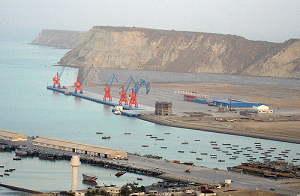The China-Pakistan Economic Corridor Between Hope and Fear
By Mushtaq A. Kaw
April 26, 2017, the CACI Analyst
In December 2016, China’s Ambassador to Pakistan, Zhao Lijian, stated that “CPEC is working well” with the support of the Pakistani people, notwithstanding certain opposition. The statement is characteristic of China’s and Pakistan’s praise for the China-Pakistan Economic Corridor (CPEC) as a game changer for their respective economies and regional connectivity. Yet in reality, the project faces a variety of intricate economic challenges as well as security threats. Its success will therefore depend upon an inclusive, balanced and sustained China-Pakistan approach towards the forces hostile to the project. Even then, the project will have various geopolitical, geo-economic and geo-strategic implications for the region and the world.

Unrest in Gilgit-Baltistan and the China-Pakistan economic corridor
By Sudha Ramachandran
September 29th, 2016, The CACI Analyst
Rising unrest in Gilgit-Baltistan and India’s growing assertiveness in laying claim to this region has set alarm bells ringing in Islamabad and Beijing. After all, Pakistan’s control over Gilgit-Baltistan is essential for the success of the China-Pakistan Economic Corridor (CPEC) project. China is pressing Pakistan to legalize its relationship with Gilgit-Baltistan. Pakistan’s options are fraught with risk.
The death of Mullah Mansour and the future of the Taliban
By John C.K. Daly
June 7th, 2016, The CACI Analyst
On May 21, a U.S. drone attack killed Taliban leader Mullah Akhtar Muhammad Mansour and taxi driver Mohammad Azam near Nushki in Pakistan’s Baluchistan province. Mansour was returning from Taftan, Iran, where he had gone for medical treatment, to his residence near the provincial capital Quetta, a 370-mile journey. Mansour and his driver had completed roughly two-thirds of the nine-hour trip. A Pakistani passport and a Computer National Identity Card (CNIC) identifying Mansur as “Wali Muhammad” were found near the wreckage. Mansour’s death, coming nine months after his contested election as “Amir al-Mu'minin” by the Taliban’s Rahbari Shura, has added additional volatility to Afghanistan’s complex political landscape, effectively sidelining any possibility of renewing peace negotiations with the Afghan government as Mansour’s successor seeks to consolidate his position.
China eyes Iran's potential as a trade corridor
By Sudha Ramachandran
May 26th, 2016, The CACI Analyst
Iran’s location near key trade routes and strategic waterways could make it a major Eurasian trade and transit corridor in the coming decades. China is keen to tap into Iran’s potential. But will Iran’s rise as a trade hub undermine the importance and prospects of the China-Pakistan Economic Corridor (CPEC)? This possibility has raised concerns in Pakistan that China’s commitment to making the Gwadar port a key node in the CPEC could dwindle as Iran’s trade corridors take shape and if Pakistan’s government fails to address China’s security concerns.
The China-Pakistan economic corridor and Baluchistan's insurgency
By Sudha Ramachandran
January 18th, 2016, The CACI Analyst
As the China-Pakistan Economic Corridor project gathers momentum, concern is mounting over the security situation in the restive Baluchistan province. The Pakistani government has promised to beef up security for the project, but will this work? Its strategy to deal with Baluch nationalism, which has focused on military operations, has contributed to the emergence of an array of armed militias – Baluch nationalist, Islamist and sectarian. Can the economic corridor thrive or even survive in the midst of this bubbling cauldron?







